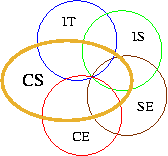 Computer Science has its own unique identity, and must be distinguished from several other computing-related endeavors.
Computer Science has its own unique identity, and must be distinguished from several other computing-related endeavors.
- CS is not the same as programming. Computer programs serve as a means of expression of CS concepts. By analogy, one must know the French language in order to explore French culture in depth. CS students need programming skills in order to comprehend the issues of CS beyond a surface level. Although programming skills are a means to an end, and not themselves the end for CS, St. Olaf CS graduates emerge with strong programming skills.
- CS is not the same as Information Technology (IT), which provides services such as technical management, product development, and consulting. However, IT tools and practices make very interesting examples and objects of study in CS. CS courses make a great background for working in IT, because they include a lot of computing experience, and especially because CS focuses on the unifying principles behind computing systems.
- CS is not a branch of Engineering. CS’s focus on abstraction and theory distinguish that discipline from Computer Engineering (concerned with design and construction of computer hardware), Software Engineering, and related disciplines. On the other hand, CS and engineering share a vital interest in design principles.
- CS is not a branch of Mathematics. Theory and proof are at the heart of Mathematics; in CS, abstraction and design have equal centrality with theory. Both Mathematics and CS develop analytical thinking skills, which help you get ahead no matter what you pursue in today’s technological world.
- CS is not the same as Information Systems (IS), which concerns applications of computing to business and industry, and to business management of technology and technology personnel. Computer scientists seek to understand the nature of computing better through conceptual themes, whereas information systems professionals seek strategic applications of computing. The study of CS gives the IS worker savvy about computing, because CS’s focus on analytical skills and on fundamental structures and capabilities of computing systems means extra problem-solving knowledge and power in practical applications.
As you can see, even though CS distinct from these other fields, studying CS helps prepare for careers and/or continuing study in any of them. St. Olaf’s curriculum is designed so that whether you take one CS course or ten, you’ll learn enduring principles that give insight in computing-related endeavors.